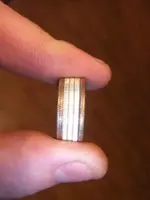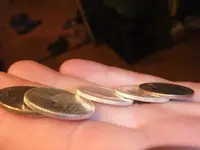Broken knee said:
Iron Patch said:
DirtDodger said:
Iron Patch said:
DirtDodger said:
First, I did not say it did not need to have the dirt removed.
Second, I ask anyone who thinks cleaning a coin to take it to any knowledgeable profession or ANA (American Numismatic Association) certified dealer and ask them if you should clean it with Peroxide. I am willing to bet none of them are going to tell you should. It should be done by a professional. Period.
The first rule of coin cleaning is: If you don't know its value, don't clean it, or if you think it is valuable, don't clean it, or if you know it is valuable, don't clean it. In other words, do not clean your discovered coins; leave them untouched and stored in proper holders. The reason for this is that coin dealers and collectors are interested in purchasing coins in their original condition and natural state of preservation. For example, never clean coins with commercial jewelry and metal polishes or silver tarnish remover, which will remove the toning that normally collects over time on copper and silver coins. Removing tarnish often harms coins, leaving small spots, scratches, or pockmarks that can significantly diminish their numismatic value by up to 90 percent! Statistically, nearly 20 percent of coins shown to coin dealers are rejected because they were improperly cleaned, polished, or their toning was chemically enhanced. Remember, you cannot unclean an improperly cleaned coin.
The second rule of cleaning coins is take your coins to a professional do the cleaning. Coin cleaning not be attempted by an amateur.
As for someone experience with cleaning a $500 coin and making it a $5k coin. Well, I can't say much other than I'm happy for your good fortune. Remember if it sold for 5k it was always a 5k coin. Cleaning does not enhance the value. It can if done improperly reduce the value.
I'll see if I can find the thread of the 1877 Indian that was sent in and totally destroyed by the "professionals."
You can spin it how you want, but I would not have got more than $500 for my coin without cleaning it. What the problem appears to be is that you're talking general guidelines that apply to non dug coins and believing the same holds true for dug. The 77 Indian posted here is dug, and is definitely going to have issues, and nothing will change that. At this point the way to make it the most valuable is to give it some eye appeal, and the peroxide is not going to do anything that the ground hasn't already done so far. You're definitely entitled to have your own opinion, but I probably have more experience than you realize and can back up anything I say.
No, Sir I was not quoting general guidelines for non-dug coins - Those guidelines apply to ALL coins. With more than 40 years collecting coins and as a long time member of the American Numismatic Association (ANA) I have a fairly extensive background in numismatics.
Yes, some soils can damage a coin far more than some chemicals… that still don’t mean those chemicals should be used for cleaning coins.
Rinsing or soaking the dirt off with water is not cleaning a coin. Anyone knows a dug coin needs the dirt off it to properly evaluate it. The question is how to remove the surface dirt. Your method is totally NOT advisable and one anyone who knows coins (dug or not) would not endorse it. It is unwise and could devalue a great coin.
I realize that this will not impact your thoughts on this matter as your opinion is made up, it is directed to the rest of the folks out there… the last thing any coin collector wants to see is a coin ruined.
Yes, even experts can ruin coins cleaning them, that should be enough of a warning that care should be taken. If they can ruin them, and then a non-expert stands a much greater risk of destroying them also.
PLEASE to all the rest of you consult an expert on any coins like this ’77 before cleaning. Also, remember not every local dealer is an expert in this area. Search out an ANA, or Professional Numismatists Guild (PNG) certified expert. Just like anything else, listen to the pros and cons and make an informed decision. It never hurts to have more information.
Gotcha. Now please tell us how to clean a very corroded 200+ year old copper coin so no value is lost.
IP, I would like to here his answer as well.
Broken Knee
It’s improper for me to advise anyone or anyone else to provide on the best method for cleaning unless the have expert knowledge. I didn’t in my any of comments advise anyone as to the best way to coin any coin.
The key point I am trying to tell everyone is IF it is a valuable coin such as this one; use caution. You can never undo the damage from improper cleaning.
PRESERVATION should be the objective, not cleaning.
Each coin is different each case needs to be looked at individually and assessed. Example, one might be willing to chance cleaning or method on a $100 coin vs a $100,000 coin.
As for a 200 year old coin that is heavy corroded; even if it were a very valuable coin being in that state would require someone with expertise in handling removal of the corrosion so the coin could be preserved in the best possible state so it retains as much as the value as possible. Yes, there are many ways to remove the corrosion, but the one used should be the one that BEST preserves the coin and its value. Most people, non-collectors and collectors (including myself) are not experts on removal of the corrosion that is why I tried to explain ask someone who is. I would not ask my doctor to fix my car or my mechanic to check my heart…. It applies to this too.
Please note; the only method I ever heard that most experts agree on is soaking copper coins in olive oil. I have an article where coin auction house (the owners are some of the foremost knowledgable in world) applied this to a pair of extremely valuable copper plates of first strikes of US dollar coins found by detectorists at the first mint site in Philadelphia. This method takes time, they soaked them for several month if I recall correctly.
Coins that are not truly valuable unlike as the ’77 here, cleaning them whether by harsh means or chemicals will not affect their value. This is true of most (not all, example: chain cent) of the early copper coins I see here and I have dig up. I have clean non valuable coins myself using every know method knowing that they had little or no value anyhow. One type I generally clean that have little or no value are nickels. The surface is generally totally ruined when it spends time in the soil. I have used harsh methods so I can see the details and date, some harsher than chemicals mention in this thread. They are not valuable. Would I use or advise someone to do this to an overdate buffalo or 1885 v-nickel or chain cent or 1877 cent or any rare coin - NO? The difference is those coin even dug up they have value.
One last thought --- Advice is cheap, but if the coin is ruined due to someone’s recommended method of cleaning; ask yourself this, are they going to make it right and pay for the damages?
 . 2004-Texas,2006-Neb and 2010 Mount Hood
. 2004-Texas,2006-Neb and 2010 Mount Hood . 2004-Texas,2006-Neb and 2010 Mount Hood
. 2004-Texas,2006-Neb and 2010 Mount Hood
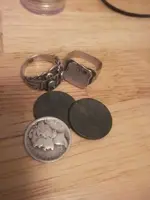
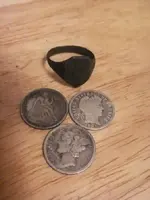
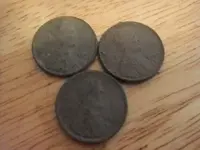
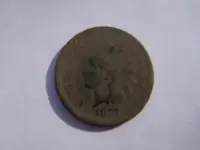
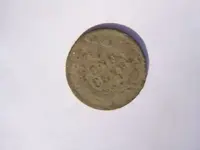
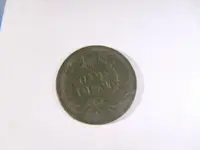
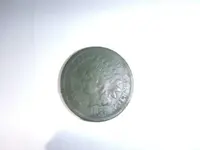
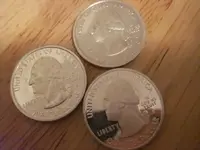

 I do not see any dates on them which is odd considering they should have a date on them. Are you sure they are real and not fake ? Even Proof coins have dates on them.
I do not see any dates on them which is odd considering they should have a date on them. Are you sure they are real and not fake ? Even Proof coins have dates on them.
